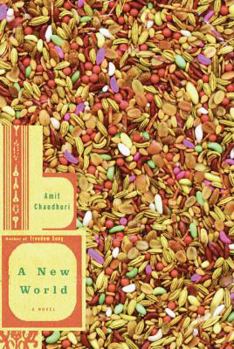A New World
Select Format
Select Condition 
Book Overview
When Amit Chaudhuri's collection of three short novels,Freedom Song, was published in the United States in 1999, it was met with unanimous acclaim. It was hailed in theNew York Timesas "an indelible... This description may be from another edition of this product.
Format:Hardcover
Language:English
ISBN:0375410937
ISBN13:9780375410932
Release Date:October 2000
Publisher:Alfred A. Knopf
Length:191 Pages
Weight:0.92 lbs.
Dimensions:0.9" x 6.0" x 8.7"
Customer Reviews
4 ratings
A relaxing and enjoyable book.
Published by Thriftbooks.com User , 15 years ago
The everyday lives of people are the same everywhere, even when there is little in common. Yet, the details of everyday life in India are so far removed from those in America that comparisons are nearly impossible. If you have not read a book about India by an Indian author, this book would be a great choice for your first one. It is not the normal fare (which I love) of eight hundred pages and constant use of words from the various languages spoken in India. Part of the difference is that Chaudhuri writes in English. Also, the main character, though born in India, has spent years in America. So, there is less of a cultural gap to be overcome in reading "A New World". If you're looking for action, suspense or romance, then stay away from this one. If, however, you're looking for a well written story of real people doing real things and having real emotions, then grab this one. The Editorial Reviews above tell you more than you need to know about the plot. The only reason I did not give this book five stars is that there wasn't enough of it. He could easily have written another hundred pages without changing the first or last chapters. I did enjoy it enough to buy three more of his books.
Poetry in still life
Published by Thriftbooks.com User , 22 years ago
A New World, Chaudhuri's most recent novel, describes the summer spent by Dr. Jayojit Chatterjee, an economist in America, (and no, he does not know Dr. Amartya Sen!) who is back in Calcutta with his son, Bonny, after a divorce. Not much emotion rises to the surface, but Jayojit does mull over what went wrong with his marriage. His dad, the Admiral, meanwhile is busy leading a retired life complaining about the shoddy performance of banks and going out for his morning constitutionals. Joy's mother fusses over him and his son, frying "luchis" for breakfast and insisting that they eat them.Chaudhuri does an absolutely brilliant job of describing the smallest of Indian transactions, such as a taxi ride or even business at the local bank. His sparse details of Jayojit's return to the US at the end of the summer, is heart-tuggingly accurate. In fact, this is the book that would tug at all kinds of strings for Indians across the diaspora. Chaudhuri's portraits of Jayojit's strained interactions with an environment at once familiar and strange to him are wonderful and something I could completely identify with. Also right on are the son, Bonny's, observations and comments about life around him. "Baba, what does "Kwality" mean?" he asks when he sees a van bearing the name on the streets. When his father explains that it is an ice cream truck, Bonny "lifts his chin from the (taxi) seat, and exclaims, "Ice cream?" as if, like doughnuts, ice cream was too outrageous to mention here."While I loved all of Chaudhuri's precise details immensely (probably because of nostalgia stirred), occasionally his poetic descriptions of even the most basic of events started grating: "The sun dimmed, as if it had been snuffed out, and then kindled again as a cloud moved past."I strongly believe that Amit Chaudhuri is a very gifted writer. His eye for precision is amazing. If he tightens his storylines, Chaudhuri will get a taste of an even bigger audience--something he most definitely deserves.
Dealing with loss
Published by Thriftbooks.com User , 22 years ago
There is nothing gratuitous about this book. Chaudhuri uses sparse language to convey the feeling of loss. The main character in the book, Jayojit, through his divorce, has lost his confidence, his desire, and his place in the world. Chaudhuri is able to communicate this to the writer with descriptions of torpor in a hot summer in Calcutta. There is no real plot, just a description of a summer of pain and, one hopes, of partial rebirth. Chaudhuri's writing is reminiscent of Hemingway. Unlike many Indian authors today, he writes cleanly and sparsely and does not feel the need to provoke the reader.
A sensitive depiction of everyday life
Published by Thriftbooks.com User , 23 years ago
Amit Chaudhuri chronicles the return to Calcutta of an Indian-American who has recently been divorced. His arrival, his return to his parents' home, his re-immersion in Calcutta, his attempt to move through each unexceptional day -- all of these are the means by which this inarticulate and inadequate man tries to deal with the great crises which confront him. Those crises are, of course, the divorce and its aftermath, including his relations with the young son who joins him on this return to India; but they are as well the gap between himself and his own parents, who are of a different generation, who are aging, who do not understand the modern world and its habit of divorce. The world is not always full of "sound and fury," as Amit Chaudhouri understands very well. Our destinies are worked out in the everyday, and we struggle as Wallace Stevens so aptly put it with "the maladies of the quotidian." It is the novel's triumph that these struggles reveal themselves beneath the everyday events Chaudhouri describes so well, and that a sense of loss and inadequacy permeates the quietly lyrical descriptions which are the substance of the novel.






